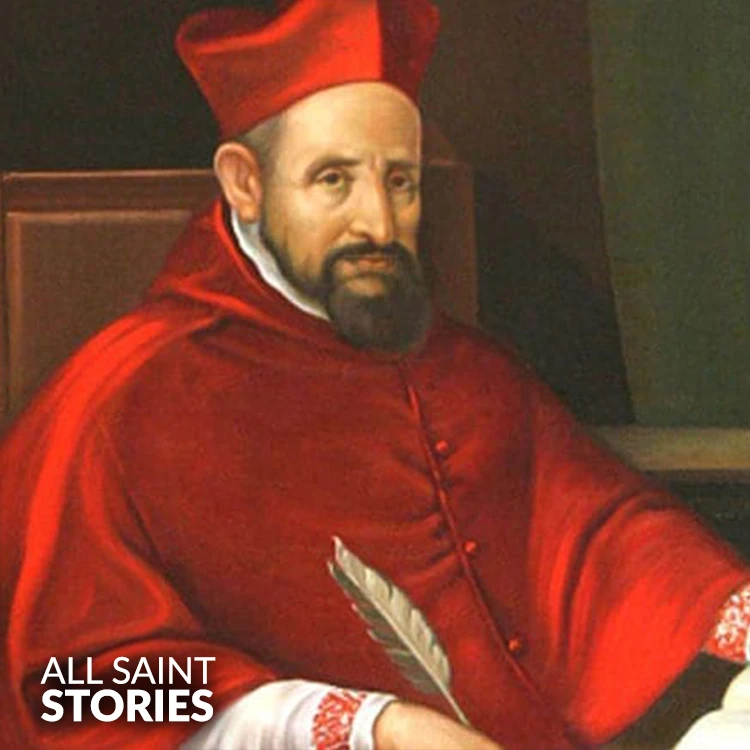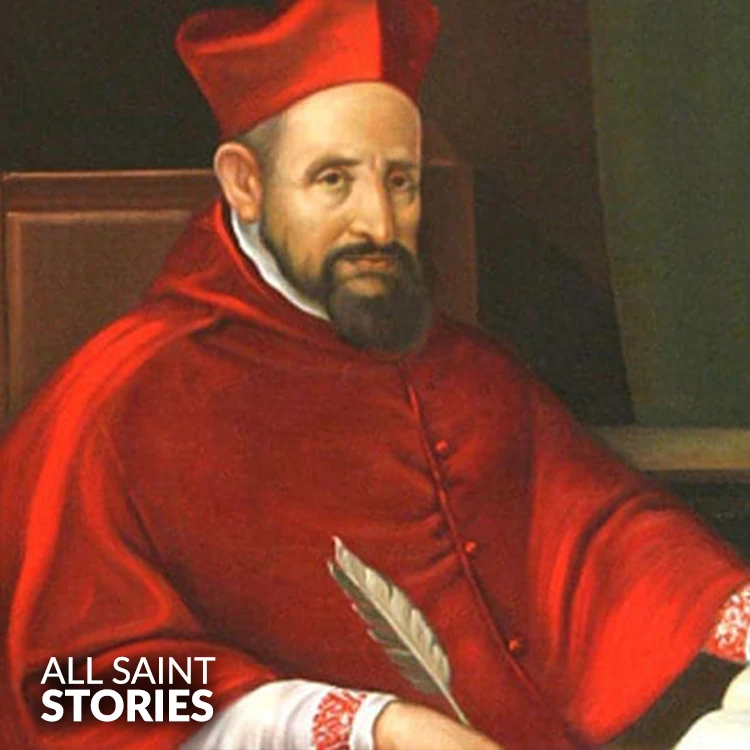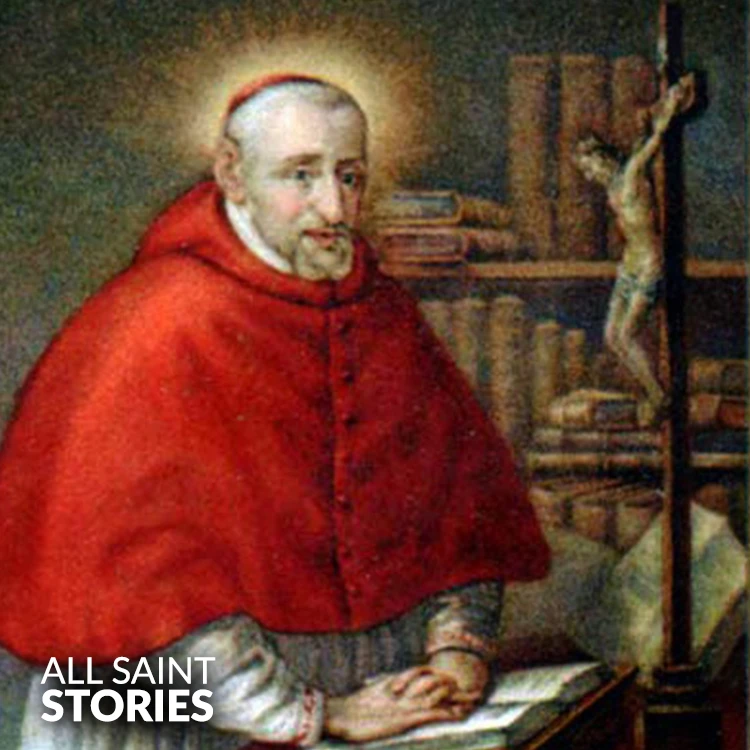"Saint Robert Bellarmine, faithful servant of the Church, defender of the faith, and guide to those in need, pray for us that we may grow in knowledge and holiness. Help us to stand firm in our faith and seek truth in all things. May your example inspire us to live with integrity and courage. Through Christ our Lord. Amen."
ST. ROBERT BELLARMINE ( BISHOP)
ST. ROBERT BELLARMINE ( BISHOP)

St. Robert Bellarmine was a renowned Jesuit theologian and cardinal who played a vital role in the Catholic Counter-Reformation. His writings, particularly his defense of Catholic doctrine against Protestantism, made him one of the most significant intellectual figures of his time. He was canonized in 1930 and declared a Doctor of the Church, with his feast day celebrated on September 17.
St. Robert Bellarmine was born on October 4, 1542, in Montepulciano, Italy. A member of the Society of Jesus, he entered the Jesuit order at the age of 18 and was deeply committed to studying philosophy, theology, and the sciences. His intellectual abilities were apparent from the beginning, and he quickly rose to prominence within the order. Bellarmine was appointed as a professor of theology at the Roman College, where he made significant contributions to the education of future Jesuits.
One of his most significant works was the Disputationes de Controversiis Christianae Fidei (Disputations on the Controversies of the Christian Faith), which systematically addressed and countered Protestant theological arguments. His defense of Catholic doctrine, particularly regarding the nature of the Church, the papacy, and the sacraments, made him one of the leading figures in the Catholic Church's response to the Protestant Reformation. His work also extended to questions of scriptural interpretation and the authority of the Church, where he emphasized the importance of tradition and the magisterium.
Bellarmine's theological acumen made him a trusted advisor to the popes of his time, including Pope Clement VIII, who appointed him as a cardinal in 1599. As a cardinal, Bellarmine continued his work as a theologian and scholar but also took on various administrative roles within the Church. He was deeply involved in the defense of papal authority and played a key role in the Church's response to the challenges posed by both Protestantism and the growing power of secular governments.
Beyond his theological contributions, Bellarmine was known for his pastoral care and his efforts to reform the clergy. He was a strong advocate for clerical education and emphasized the importance of moral integrity in the life of the priesthood. His efforts to improve the spiritual life of the Church led him to take a personal interest in the formation of priests and the education of young Jesuits.
Bellarmine was appointed Archbishop of Capua in 1602, although he never took up the office personally, preferring to continue his scholarly and theological work in Rome. He was known for his humility, his devotion to prayer, and his commitment to a simple, austere life. Despite his high rank in the Church, he lived modestly and was often described as a man of profound piety and integrity.
His intellectual and pastoral contributions were recognized by the Church long after his death, and he was beatified in 1923 by Pope Pius XI. In 1930, Pope Pius XI canonized him as a saint, recognizing him for his extraordinary work in defending and promoting the Catholic faith. Bellarmine's feast day is celebrated on September 17, the anniversary of his death in 1621.
Bellarmine's legacy is deeply rooted in his intellectual contributions to Catholic theology. His writings continue to be influential in the study of Catholic doctrine, particularly in the areas of ecclesiology and the relationship between the Church and scripture. He was a key figure in the Counter-Reformation, not only for his scholarly defense of Catholic teaching but also for his tireless efforts to reform the Church and to ensure the education and spiritual formation of its clergy.
Video Not Found
The information on this website is compiled from various trusted sources. While we aim for accuracy, some details may be incomplete or contain discrepancies.
If you notice any errors or have additional information about this saint, please use the form on the left to share your suggestions. Your input helps us improve and maintain reliable content for everyone.
All submissions are reviewed carefully, and your personal details will remain confidential. Thank you for contributing to the accuracy and value of this resource.
Credits & Acknowledgments
- Anudina Visudhar (Malayalam) – Life of Saints for Everyday
by Msgr. Thomas Moothedan, M.A., D.D. - Saint Companions for Each Day
by A. J. M. Mausolfe & J. K. Mausolfe - US Catholic (Faith in Real Life) – Informational articles
- Wikipedia – General reference content and images
- Anastpaul.com – Saint images and reflections
- Pravachaka Sabdam (Malayalam) – Saint-related content and insights
We sincerely thank these authors and platforms for their valuable contributions. If we have unintentionally missed any attribution, please notify us, and we will make the correction promptly.
If you have any suggestion about ST. ROBERT BELLARMINE ( BISHOP)
Your suggestion will help improve the information about this saint. Your details will not be disclosed anywhere.
© 2026 Copyright @ www.allsaintstories.com





 English
English
 Italian
Italian
 French
French
 Spanish
Spanish
 Malayalam
Malayalam
 Russian
Russian
 Korean
Korean
 Sinhala
Sinhala
 Japanese
Japanese
 Arabic
Arabic
 Portuguese
Portuguese
 Bantu
Bantu
 Greek
Greek
 German
German
 Dutch
Dutch
 Filipino
Filipino